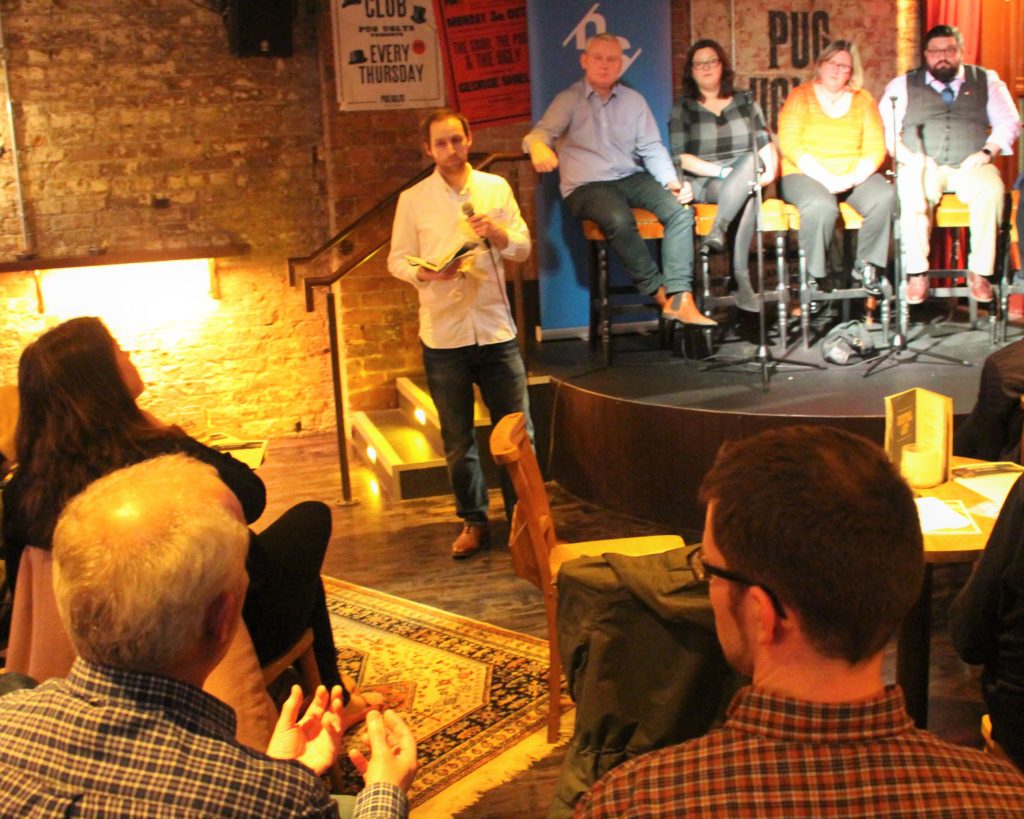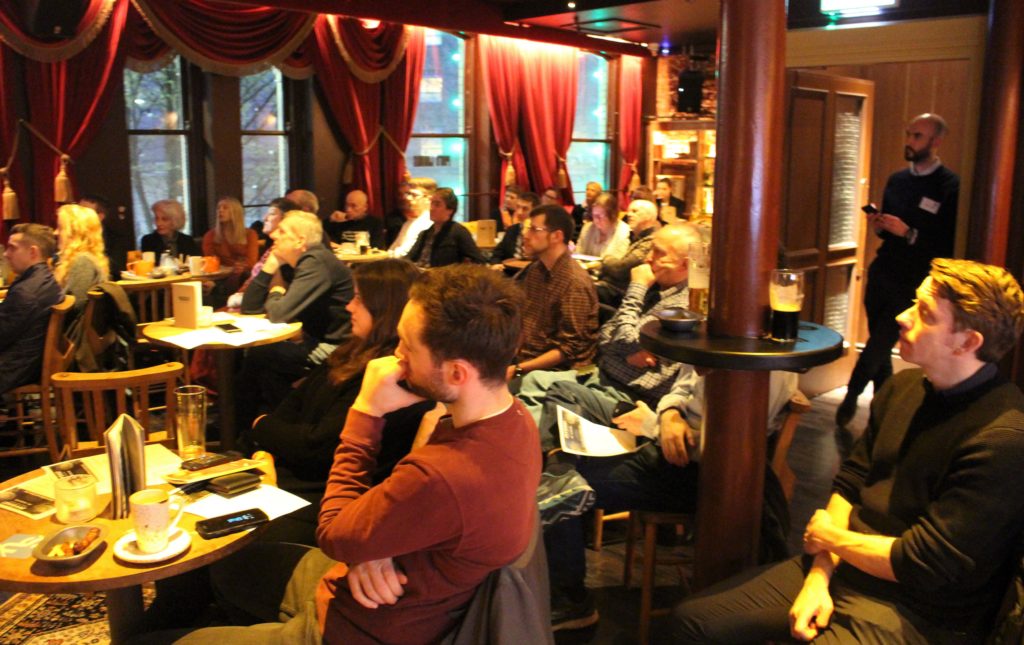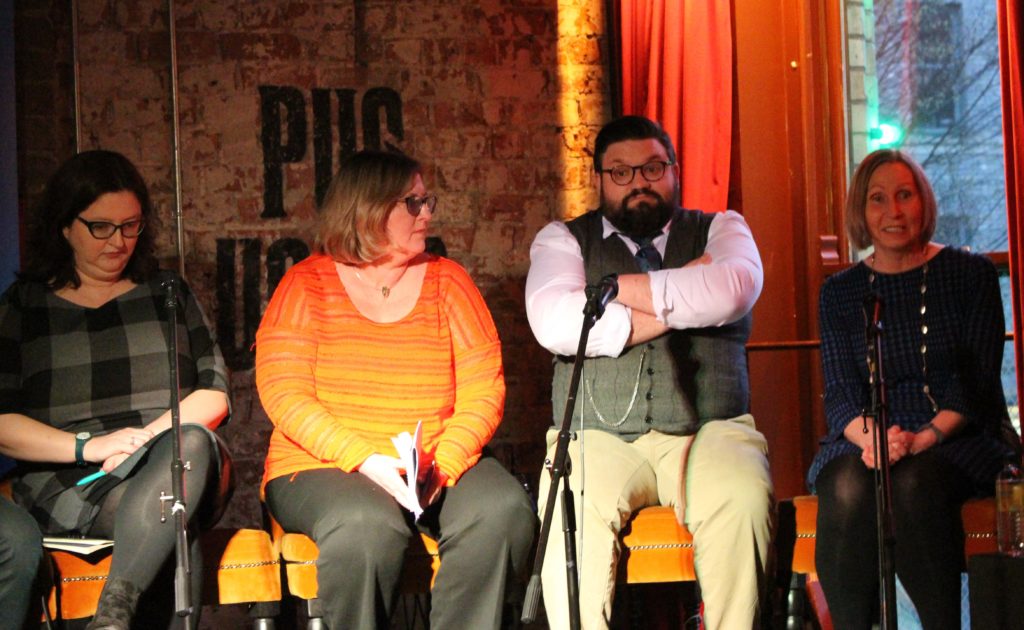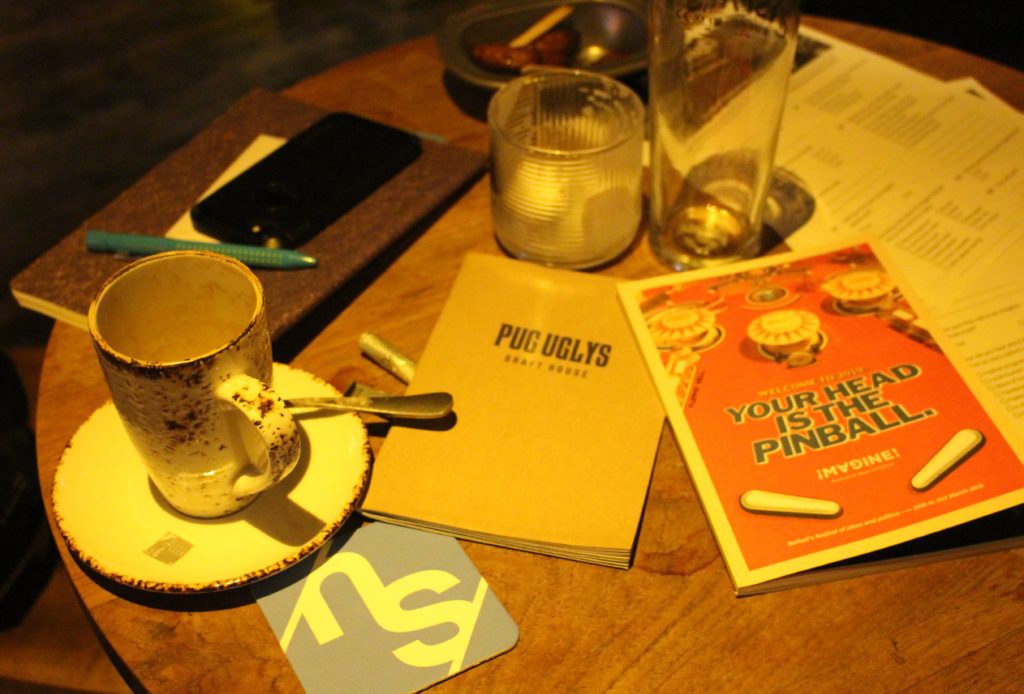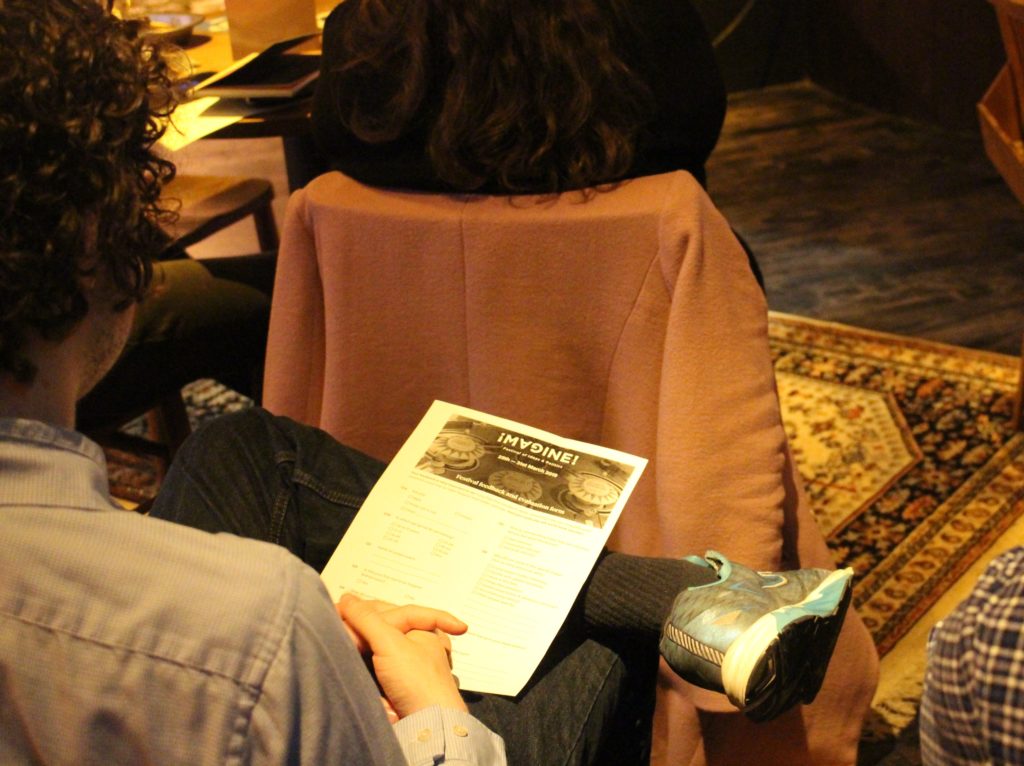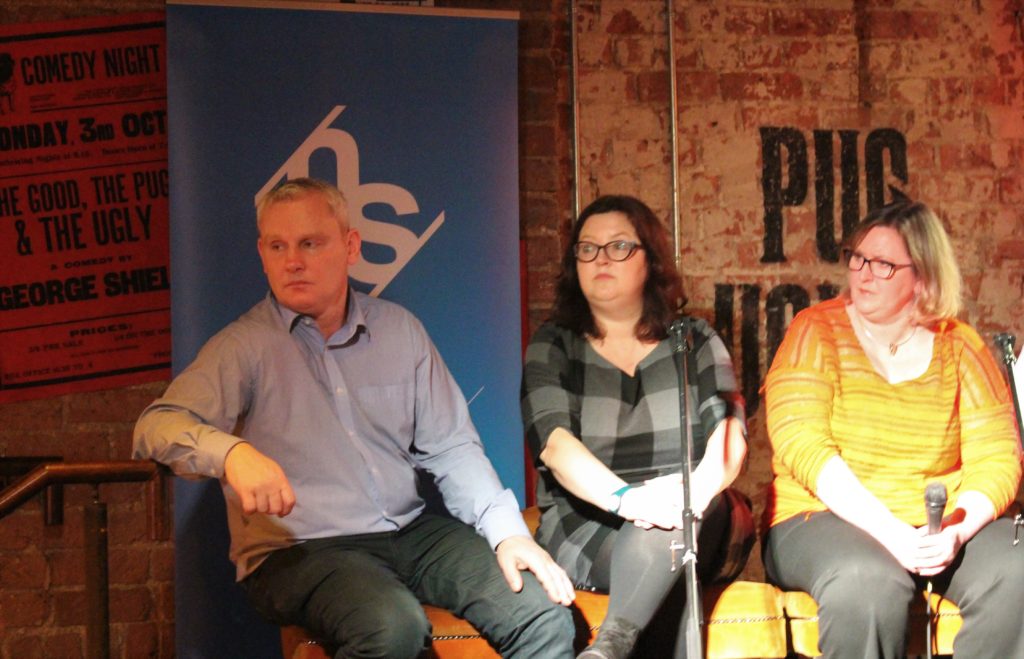Who are political leaders? How does politics happen? What are the opportunities to do politics differently in Northern Ireland and how can we, as citizens and not just voters, bring about positive change? Northern Slant had the privilege of rounding off the opening day of this year’s Imagine! Festival of Ideas & Politics in Belfast with a panel discussion on the topic of “Politics Beyond Politicians” – these are just some of the questions we put to our guests, exploring how in the absence of the Northern Ireland Assembly civic society can lead.
An appreciative full house at Pug Uglys bar on Bedford Street enjoyed listening to and engaging with our knowledgeable and experienced panellists, who came from a broad cross-section of civic society and activism. The event was kindly sponsored by the Linen Quarter BID. Our panellists were:
- Aodhán Connolly, Director, NI Retail Consortium
- Linda Ervine, Irish Language Development Officer, East Belfast Mission
- John McCallister, former MLA; currently Land Mobility Manager at Ulster Farmers’ Union and Northern Ireland Human Rights Commissioner
- Karen Smyth, Head of Policy and Governance, Northern Ireland Local Government Association (NILGA)
- Grainne Walsh, Head of Consultancy at Stratagem Public Affairs and member of Citizens’ Assembly Advisory Board
Decisions are still being made… the arenas for discussion have changed
All panellists spoke of the changes that their roles have undergone since the collapse of the Assembly in January 2017. Aodhán said a lot of people have been working “like a duck”, where on the surface it looks like everything is just gliding along effortlessly, but underneath you’re working frantically on behalf of the people whose interests you represent. “Instead of talking to one minister or one special adviser, you’re talking to the heads of directorates of several different government departments just to get anything done.”
“For us in [the retail] industry, there are a lot of mission-critical decisions that are on the back burner, or that are secondary to concerns that don’t have an economic effect.” As examples, he contrasted the business rates system in Northern Ireland with the Barclay Review in Scotland, as well as the progress of legislation for protection of shopworkers. “It’s not just about pounds shillings and pence, it’s about things that affect people’s lives, and for me that’s hugely frustrating.”
Karen talked about policy and strategy developments, affecting issues like social housing, that should be well underway but aren’t because of a lack of secondary legislation. “There’s a heap of stuff just sitting on a minister’s desk,” she said. “There’s been an uplift in the need to keep an eye on what’s happening at Westminster and we’re trying at local government level to fight our corner for Northern Ireland but it’s difficult because you’re quite a small part of the whole machinery.”
Grainne said what’s changed primarily are the arenas where public policy discussions about change takes place. “It’s now more at a local government level. It’s at Westminster level. And it is with political parties in their role as influencers and community representatives. Because MLAs remain important no matter what, even if they aren’t up at the Assembly.” She spoke of a year of “stalled engagement” where clients were waiting to see when the Assembly would return, but that they have now realised that time doesn’t stand still. “Decisions are being made,” she continued, pointing to the go-ahead for the power station development in Belfast Harbour, “and it’s interesting to find out who those decision makers are.”
John, who was an MLA from 2007 to 2016, said: “Like the Titanic, it was alright when I left it…” He echoed the other panellists about an increased necessity to look towards London, adding that Northern Ireland currently is “in the worst of both worlds, that we technically still have devolution, but we don’t have ministers or any executive function. We have civil servants that are doing their best but will not and cannot make decisions around changes of policy; so we’re very much in a holding pen, with no immediate sight of that changing.” Brexit and the upcoming local elections on 2 May, John said, have probably constrained any opportunities to re-start talks until the autumn.
The influence of politicians can be more divisive than constructive
Indeed, while the spectre of Brexit seems to hang over everything in terms of “big picture” politics and planning, for Linda the problems at a grassroots level are more to do with the intractability of our opposing parties. Having seen her Irish language centre in East Belfast grow into one of the city’s largest, with 70% of her students – 250 this year – coming from the unionist community, she spoke of her frustration that “unfortunately this is where we come down to politics on the local level.
“The gatekeepers in the communities, in my opinion vilify communities, because they tell other people ‘no, the community will never stand for that.’ But the community never gets the opportunity because they decide what the community is going to get or isn’t going to get. We brought something to East Belfast. I’m from that area, I wanted to learn Irish, and other people felt the same. The number of people who come to us, the majority of them would be from the Protestant community; they come to us because like myself, they felt that they never had the opportunity to learn the language, because of the tradition.
“People just sit down together and they make friends together, they learn together, they laugh together; and we are lauded for that. The sad thing about that is we’re not really doing anything wonderful. We’re doing what everybody should do, we’re just not sectarian. What we’re doing is what everybody should be doing.”
The influence of politicians, she added, can often be more divisive than constructive. “They’re not together building united communities. People like me, people on the ground, we are building united communities despite what they do or don’t do up in Stormont. And I think that’s where something has gone wrong. The community is doing the work of politics, the politicians aren’t. The politicians are destroying the work that they should be doing. And we‘re doing it.”
You don’t have to be a politician to lead change
There was broad consensus amongst panellists that you don’t have to be a politician to bring about positive change in Northern Ireland, or elsewhere for that matter – to do this we need to build relationships. This requires courage and resilience in spite of the wider political environment and scrutiny that comes with public profile, but we all have the power to bring about the change we want to see. Bringing folks together, having these kinds of conversations to consider solutions rather than dwelling on problems are essential steps on the journey.
That’s just a flavour of the evening’s discussion…
The full audio podcast will be available soon.
Photos are below. You can check out other tweets from the evening at the hashtag #BeyondPoliticians.
Great line up giving focused insight at the @NorthernSlant #BeyondPoliticians discussion. Communities have done more to bring people together than our politicians ever have & voters/non voters bear collective responsibility in getting the politicians we deserve pic.twitter.com/5MaHJNYX1Q
— Clare Bailey (@ClareBaileyGPNI) March 25, 2019
First Past The Poster
Meanwhile, with the upcoming council elections in mind, the Imagine! festival’s organisers “fessed up” on Friday to some campaign-related highjinks that had Belfast scratching its head and – mostly – smiling.
The mystery is over. We produced these cheeky posters in #Belfast to promote debate on politics and why we vote. The campaign only cost £300 and we didn't use public or sponsorship funds. We hope you enjoyed this bit of #devilment? Join us for #Democracy Day @CrescentArts today pic.twitter.com/9xmBPfAsGE
— ¡MAGINE! (@ImagineBelfast) March 29, 2019
Festival chairman Peter O’Neill blogged about the lamp-poster campaign, saying that the point of the “malarkey” was to “encourage debate on subjects like:
- How do we all feel about local politicians and the job they do? Especially when there’s been no functioning government in Northern Ireland for over two years.
- Is it reasonable to tar all politicians with the same brush?
- What kinds of people become politicians and what are their motivations?
- At election time, do people actually pay attention to political advertising?
- If you always vote for ‘your side’, are you asking enough about candidates before you give them your vote? What do you actually know about them and their ability to represent your interests?”
In a round-up of how the poster campaign was covered on social media, he said: “It’s been interesting to see where people have gone with this across the various social platforms and how they interpreted the messages on the set of posters. Generally, reactions ranged from comments suggesting that the campaign was simply encouraging people to examine their chosen candidate a little harder before casting their vote, right through to guesses at which dark forces were behind these obviously Machiavellian voter suppression tactics.”
You can follow social media comments about the events via the hashtag #ImagineBelfast.

